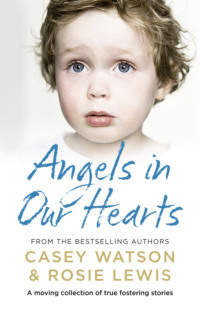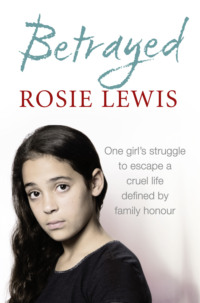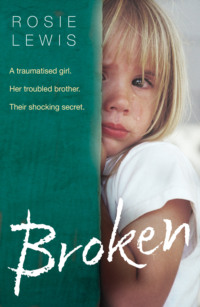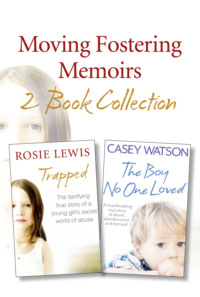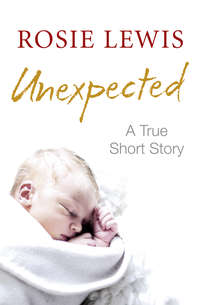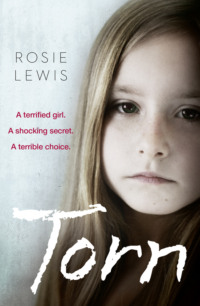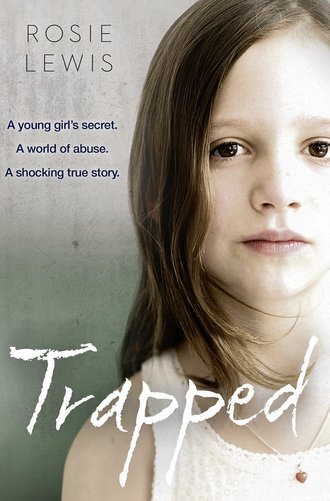
Полная версия
Trapped: The Terrifying True Story of a Secret World of Abuse
‘Stop that please, Phoebe,’ I said, my voice sharp. Clearly there was to be no honeymoon period in this placement and the sooner she learnt who was in charge, the better.
‘Stop that please, Phoebe,’ she mimicked again. Although she was using a high-pitched, scornful tone, I could tell immediately that she was well-spoken, each word precisely clipped. Thankfully my own tone had an effect. Although she fixed me with a brazen look she stopped what she was doing and began staring at me with a nasty, twisted smile on her face.
‘I’m going to my room,’ Jamie wheezed. He passed me with his head bent over so I couldn’t see his expression but the slope of his shoulders told me how he was feeling. Despite his protestations about wanting a boy, I knew he had been looking forward to meeting Phoebe.
‘OK, Jamie, that’s fine,’ I said, my voice tight as a sudden guilt clawed at my throat. What had I taken on here?
‘I’m going too.’ Phoebe flipped over the sofa and charged across the room but I stepped backwards to fill the doorway by stretching out my arms.
‘No.’ I summoned my most commanding tone. ‘We don’t go into each other’s rooms. Now go and sit down. I’ll show you around the house later, if you sit nicely while I talk to Lenke.’
‘Sit nicely while I talk to Lenke,’ she repeated, spinning around and returning to the sofa. Lenke walked past and I gestured for her to take a seat. The social worker headed for the opposite end of the sofa, hardly looking at Phoebe, who sat with her legs sprawled, glaring at me. Her hair was brown and frizzy-looking. The style was boyish, cut short to make the wiry texture more manageable, I imagined. Her eyes were appealing, light brown in colour, but seemed to swivel, giving her a slightly deranged look, and she was scarily thin, so much so that the skin across her cheekbones had a translucent quality.
‘How about we find some colouring for you to do, Phoebe?’ I said, crossing the room. ‘Emily, would you mind fetching the pens and some paper? Phoebe can sit at the table while Lenke and I chat through some of the boring details.’
Emily was watching Phoebe, intrigued. ‘Sure,’ she answered, giving me a sidelong glance. ‘Come on, Phoebe.’
‘Come on, Phoebe,’ she chorused. Emily giggled in response and out of nowhere I remembered reading A Series of Unfortunate Events to her when she was younger. One of the characters in the book, the headmaster, mocked everything the Baudelaire children said. His outlandishly rude character had captured Emily’s imagination at the time and she found it hilarious. I wondered if she was thinking the same as me.
‘Would you like tea, coffee?’
‘No, it is fine.’ Lenke waved her hand and pulled her substantial coat a little tighter around herself. She looked distinctly uncomfortable. The social worker wants this over with, I realised, as I sat next to her on the sofa.
‘So,’ I said in hushed tones once Phoebe was settled at the dining table. Our house is open-plan so even though I could still see her, she was out of earshot. ‘What’s the story with Phoebe?’
‘Oh,’ Lenke waved her hand dismissively. ‘Phoebe, she has a touch of, er, what you say?’
I shook my head.
‘Er,’ she hesitated then reached into her bag, pulling out her diary and flicking through it as if the word she was looking for would miraculously leap from the page. ‘I do not have the, what is it, the papers yet. It was all such an emergency. But it is, er, I think you say autism?’
‘Autism?’ I said, louder than intended. Phoebe inclined her head, staring at me with a strange grin on her face and then, without warning, she threw her head back and began barking. ‘That wasn’t mentioned by the agency,’ I said over the din. Of course, autism would explain her erratic behaviour. The mimicking, screeching and barking made much more sense now.
‘Well, it’s how you say, erm, mildly, not much autistic.’
‘Really?’ In the background I could see Phoebe flapping her arms in front of herself like a demented penguin. That could never be described as mild, I thought drily, not in any language. Emily was watching the antics of the new arrival, her eyes wide with fascination.
‘Why was she taken into police protection?’
Lenke watched my lips avidly. ‘Excuse me?’
‘I said …’ I raised my voice again to compete with the animal noises coming from across the room. Phoebe fixed me with another icy stare. ‘Why has she been removed?’
‘Er, she is, erm, telling one of her teachers today that her mum hurt her arm. She twist it behind her back, so she say.’
‘Is she known to social services already?’
‘Sorry? I don’t know this …’
‘Is she subject to a Child Protection Order?’
‘Oh no, no,’ Lenke shook her head. ‘This family is fine, no problems. Her father is very successful financier. Respectable. I think that this is possibly false alarm. It may be, erm, possibly part of the illness. We interview the parents this afternoon. They are mortified, really. Nice people, yes. She should be able to go home as …’
A scream from across the room stopped Lenke in mid-sentence. The noise was somewhere between a balloon squeak and a smoke alarm. ‘Please, Phoebe,’ I said evenly but kept my tone stern, ‘don’t scream, sweetie. It’s upsetting.’
‘Don’t scream, it’s upsetting,’ she repeated contemptuously, but picked up another pen and returned to her colouring.
Lenke smiled serenely, the picture of innocence. ‘I think it be good for her parents to have a break. When she back home we will look into the, how you say,’ she fluttered her hand through the air, as if trying to catch the right word, ‘you know, a rest?’
‘Respite?’ I offered.
Lenke nodded emphatically. In the background Phoebe began flapping again, this time accompanied by a loud ‘whoop-whoop’ noise. I could certainly understand how her parents may have reached the end of their tether, dealing with such severe problems on a daily basis. We’re going to have our work cut out here, even just to get through a few days, I thought rather guiltily. Still, Phoebe was just a little girl and we would have to make the best of it. I had dealt with difficult situations before, I reassured myself. There had been times in the past when I had been daunted by difficult behaviour but with patience and support from my family we had managed to overcome whatever problems we encountered.
Within half an hour I had signed several copies of the Placement Planning Agreement. Most of the form was blank since so little was known about Phoebe but the basic facts were there, along with her parents’ details. Their address caught my attention – Rosewood Drive, a rather prestigious road several miles from us, with manicured lawns and substantial houses. So, the family must be fairly well-to-do, I thought to myself, which tied in with her well-spoken accent. Most of the children I had cared for in the past were from impoverished backgrounds.
Every family has its problems, I mused. ‘Is she on any medication to control her …?’ But Lenke zipped up her bag, then stood, tying her belt around her coat. I guess that’s a no then, I thought. She began drifting from the room, her relief palpable.
‘Well, that is all I know for now. I’ll leave you to it, Rosie. Bye bye, Phoebe.’
Phoebe barked in response.
‘Good luck, Rosie,’ Lenke called out over her shoulder as I stood on the doorstep, waving her off. ‘Ah, I forgot to mention one more thing: the school says that Phoebe has the condition called pica so you need to be careful about leaving her unsupervised.’ I stared at her agog but she scuttled down the path without a backward glance. She may as well have shouted, ‘See you, wouldn’t want to be you!’ Not for the first time since I received the initial call about Phoebe, I was filled with a growing trepidation.
I remembered from our initial training that children with pica were inclined to eat inedible objects. I had no personal experience of the condition but guessed it meant that Phoebe would have to be treated like a toddler: any object could be a potential choking hazard. I was beginning to understand how difficult it must have been for her parents to cope with her.
It was as I closed the door that a strange groaning noise from the dining room drew me back. Emily called out, ‘Mum, I think maybe you should come here …’
Rushing back into the room I noticed the look of concern on Emily’s face as she watched Phoebe standing on the table with her legs spread wide, loudly remonstrating with thin air. Her arms flailed wildly as she spewed words out in no meaningful order – ‘You get that off, pens so useless, rip it out, bitch!’
‘Are you alright, Phoebe?’ Emily asked, moving forwards before I could form the words to stop her.
Phoebe screamed, kicking Emily’s outstretched arm, hard.
Chapter 4
‘We don’t kick in this house,’ Phoebe mimicked in response to my admonishment, her lip curled into an ugly sneer. She stared at me with defiance, her feet still firmly planted on the dining room table.
Following her brother’s recent footsteps, Emily had disappeared upstairs, shocked by the violence of Phoebe’s outburst. I forced myself to take a few deep breaths, my mind racing to come up with a strategy to deal with her behaviour. Making a mental note to research autism as soon as I had the time, I summoned a commanding tone. ‘Get down from the table, please, Phoebe. I’d like to show you around.’
As I spoke I ran through my discipline options if she refused to move. My mind drew a blank but fortunately she climbed down, giving me a flinty, hard stare. ‘Good girl,’ I said, forcing a bright tone. ‘Now, let’s show you where you’ll be sleeping.’
A shadow crossed her features, giving me a brief glimpse of a little girl lost, but a moment later it had gone, replaced by the same disturbing glare. ‘Woof, grrrr, woof.’ Phoebe followed, close at my heels. I sensed it would be futile to ask her to be quiet so I raised my voice above hers and launched into my standard welcoming speech, hoping she might be interested enough to stop.
‘This is Emily’s room,’ I said as we passed my daughter’s bedroom. I pictured Emily nursing her sore arm on the other side of the closed door and a wisp of anger rose to my throat. Seeing your own children physically hurt is a bitter pill to swallow, especially when they put up with so much anyway. Phoebe’s just a young girl with a complex medical disorder, I reminded myself, she probably doesn’t even register what she’s done.
‘We don’t go into each other’s rooms, ever. If I’m in my bedroom and you need me, you must knock on the door and wait, OK?’
Some of my fellow foster carers had been through the anguish of having allegations made against them and I wanted to protect my own family from a similar fate as vigorously as I possibly could. Of course, following the rules by keeping the children out of each other’s bedrooms could never provide full immunity from malicious allegations but by following the guidelines and keeping meticulous daily records, I was doing as much as I could to protect us all.
‘Knock on the door and wait, OK?’
‘And this is Jamie’s,’ I said.
‘This is Jamie’s.’
I stared at her, wondering whether she even understood me, although something in her eyes told me that she was taking in every word I said. I remembered reading somewhere that some autistic children could be very bright. It would be helpful to hear what her teachers had to say about her but as the Easter holidays were about to start that wouldn’t be possible. Going by what Lenke had said, Phoebe would be back with her family before the start of the summer term so I knew I might not get the chance at all.
Phoebe charged clumsily along the hallway but when we reached her room she hovered in the doorway, suddenly reserved.
‘It’s alright,’ I told her. ‘You can go in. Have a look around – this is where you’ll be sleeping. It’s a safe place. No one will come into your room except me, and only when you want me to. If you prefer me to wait at the door then I will.’
She turned slowly towards me, suddenly bereft. ‘I want to go home,’ she said, her bottom lip quivering.
‘I know, sweetie,’ I said, all irritation gone. For the first time since she’d arrived she looked like an ordinary, fragile girl. No eye swivelling, flapping of arms or yelping. I felt a flash of relief knowing there were times when she could be still, if only for a moment. Reaching out, I touched the back of her head, hoping the gesture would communicate my solidarity. She flinched, darting out of the way.
What did you do that for? I chastised myself. Knowing nothing of her history, I should have known better than to offer her physical comfort. Perhaps her parents were a bit heavy-handed with her, I thought, if the way she recoiled from me was anything to go by.
Lowering myself to my knees at the threshold of her room, I beckoned her over. She shook her head, backing away and barking loudly like a resentful Rottweiler guarding its territory. When she reached the wall she crouched, lowering herself to her haunches. Her barks subsided to little yaps.
‘Phoebe, can I come in and give you a hug?’
A look of puzzlement crossed her face and my heart went out to her. She seemed so lost. Tempted to sit beside her and take her onto my lap, I hesitated, waiting for her agreement. She stayed silent so I rocked back onto my outstretched feet instead; it would be wrong to assume she wanted comfort from someone she barely knew.
‘Phoebe, you’re safe here, honey. Do you understand?’
The tiniest nod told me that she’d heard so I reached around the corner and grabbed a notepad from the bookshelf beside her bed. ‘Good. Now, this notepad is especially for you. On one page I’d like you to write down all the foods you really don’t like and then I’ll make sure I don’t give them to you. On the other side you can make a list of your favourites. Is that OK?’
She shook her head and began barking again.
‘Does that mean no?’ I knew that food was one of the issues that children found most frightening when coming into care. The upheaval of leaving home, being separated from their parents and having to adjust to a whole new environment full of strangers was daunting enough. To then be confronted with strange, unfamiliar food seemed to be the tipping point for many children, often making their first mealtimes a traumatic experience, with lots of tears.
In the past I had found the tension at the dinner table could be avoided by finding out beforehand what the children liked to eat. Phoebe continued to shake her head and I wondered about the extent of her learning disabilities. Developmental delays weren’t unusual in children who were brought into care, although Phoebe, coming from a middle-class background, wasn’t a typical example of a Looked After Child. I knew the latest neuroscience research suggested that high levels of stress in infants could have a damaging impact on the brain, affecting future learning. Perhaps she was unable to write?
‘I only eat porridge.’
‘That’s fine,’ I said, in a reassuring tone. ‘Porridge makes a great breakfast – we often have porridge too. But what else do you like to eat? Pizza? Roast, maybe?’
Phoebe began to retch, her throat making sickening noises as she heaved. Her eyes bulged and she leaned over, projecting the contents of her stomach over the carpet. She flapped her arms as if in a spasm, spattering the vomit that clung to her fingers all around the room.
I couldn’t believe how quickly the vomiting came on. As I leapt towards her she howled, her eyes swivelling back to reveal the whites. I grabbed hold of her hands to stop her from dancing in the mess but she fought away.
‘No, please, leave me, no!’
‘It’s alright, sweetie. Come to the bathroom and I’ll clean you up.’
My hands were sticky with vomit and my own stomach lurched as a foul smell rose to my nostrils. Guiding her into the bathroom, I held my breath and began filling the bath. Squeezing a generous amount of bath gel into the water, I swirled it around, knowing she would probably feel more comfortable in the water if it was full of bubbles.
‘Right, get those clothes off, sweetie.’
Phoebe began to pant, backing herself into the corner of the room. She looked terrified.
‘Would you prefer to clean yourself up?’ I tried to keep my voice even, soothing. I wasn’t surprised that she might feel too self-conscious to undress in front of a stranger, but why panic-stricken? She looked up at me with bulging eyes and gave an almost imperceptible nod.
‘OK, I’ll go and clean up your room. There’s soap and shampoo on the side. Call me if you need me, won’t you?’
I hesitated for a moment but she didn’t move so I walked out, leaving the door slightly ajar.
After conducting a hurried clean-up in her room I knocked on the bathroom door.
‘All OK in there, honey?’
There was no answer. I guessed that she had her ears under the water, rinsing off shampoo.
‘Phoebe?’ Ducking my head around the door, I gasped in shock. ‘Phoebe, no!’
Lunging towards the bath, I snatched the open bottle of bubble bath from her hands. Blood sprung from her lip and I realised that I must have caught her gum on the rim of the container as I yanked it away. Clamping her fingers over her mouth, she stared at me in horror.
‘I’m sorry, I didn’t mean to hurt you, Phoebe, but you mustn’t drink that. It’ll make you ill.’
She lowered her hand, staring at the string of bloody saliva entwined around her fingers. I expected her to cry but she continued to gape as droplets of blood spilt from her mouth into the bath water. Her whole body was trembling.
‘Did you hear me, Phoebe?’ I said, the metallic taste of panic filling my voice with urgency. She didn’t answer but a strange gurgling sound came from her throat. I began to tremble myself, worried that the thick liquid might congeal in her airways and choke her.
‘Don’t move. I’ll be right back.’
I dashed out of the bathroom and downstairs, grabbing a carton of milk from the fridge. If there were harsh chemicals in the potion, I guessed that milk might be the gentlest way to dilute the effects. As I darted back up the stairs my mind came up with a dozen catastrophic scenarios. What if she’d decided to start on the shampoo while I was gone? What if she lay convulsing on the other side of the door? Charging back into the bathroom, I was relieved to find Phoebe wedged between the toilet bowl and the bath. She was still naked and trembling with cold, her thin legs hugged protectively to her chest. Draping a small hand towel around her shoulders wasn’t easy in the confined space but I did the best I could.
‘Here, drink this,’ I said in a shaky voice. ‘It’ll make your throat and tummy feel better after drinking that yucky stuff.’
She shook her head, recoiling from me. I forced a soothing tone.
‘Come on, sweetie, have some milk and then we’ll go and explore the garden.’
She looked at me, unmoving. At the best of times it can be frustrating when a child flatly refuses to do as they are told. When their safety is at risk it can be exasperating. My usual coercion strategy is to make sure I have a few treats planned so that I can use them as leverage but at that moment there wasn’t any time for mind games.
I was tempted to grab her by the shoulders and yell, ‘DRINK IT!’ but instead I took a few calming breaths and reached for the empty bottle, scanning the label for advice. Avoid contact with eyes. If product enters eyes, rinse immediately with warm, clean water was all it said, but nothing about what to do if a vulnerable child whose care had been entrusted to you takes it into her head to down the half-full bottle in one.
‘Phoebe, please,’ I said, not too proud to use a begging tone. ‘Drink some milk and then we’ll get you dry.’
‘Drink some milk and then we’ll get you dry,’ she gurgled back, her pupils wide and staring.
Irritation cleared my head and I held up a large bath towel.
‘Come on then, up you get.’
Her bony hand darted out and she grabbed the towel, wrapping it around herself in a half-crouched position. The ends of the towel draped into the bath and over the toilet seat. When she finally stood up the floor got a soaking but at that moment a slip hazard was the least of my problems. Not wanting to let her out of my sight, I darted into my bedroom to grab the cordless telephone and guided her back into her own room.
‘You get dried and dressed while I make a phone call. Don’t worry, I won’t look.’
‘Don’t worry, I won’t look.’ Her voice rippled as though speaking underwater. Clasping the towel tightly around herself she went to her suitcase and rifled through the clothes. It struck me as peculiar that she showed no concern for her own welfare: when my own children were unwell, if they ever caught on that I was worried about them, they would ask endless questions, seeking reassurance. But it seemed as if Phoebe didn’t remotely care that she might be in danger. I wondered whether she lacked the mental capacity to understand the consequences of her actions.
A quick call to our local surgery reassured me that there was no need to dash to the hospital for an emergency stomach pumping. According to the doctor, children’s bubble bath was non-toxic and unlikely to cause any long-term damage but he did suggest that Phoebe drink plenty of milk or water and told me to keep an eye out for any further symptoms.
Before she went to bed that night I conducted a sweep of the room, removing anything I thought she might be tempted to nibble on and unwinding the decorative lights that Emily had twisted around the foot of the bed. I was still fretting about what might be going on in her stomach. She hadn’t eaten a morsel since arriving hours earlier, nothing edible at least. No wonder she was so thin, I thought. I had managed to persuade her to drink half a cup of milk, though only through a straw. She gagged whenever I tried to tempt her into eating anything else, heaving at the mere mention of food.
Consuming bubble bath was one thing but I worried that if she was really hungry she might decide to snack on something solid during the night. If an object slipped down her throat, how on earth would I know about it before the morning? The thought paralysed me and as I stood at the door and watched her climb into bed that night I almost sighed with relief at the temporary reprieve.
‘Goodnight, sweetie. Now, you mustn’t put anything in your mouth, OK? I’m just down the hall if you need me.’
As I went downstairs I felt as if I was lowering myself into a narrow box, the sides closing in around me and the lid nailed down by unseen hands. It may sound strange but at the beginning of every placement I’ve taken on, there has been a short period when I’ve felt trapped by my decision to foster. I guess it’s a natural reaction – it feels surreal to suddenly be responsible for another human being, especially when there is absolutely no connection between you.
Thankfully, I have managed to build a rapport with each of the children I’ve cared for in a short space of time, usually within a few days. As each relationship strengthened, I found that the claustrophobia ebbed away. The trouble was, with Phoebe, I just couldn’t see it happening. Down in the living room, I visualised the virtual calendar I had in my head; she would be gone before the end of the Easter holidays – one day down, 13 to go.
Chapter 5
The next morning I woke at just after 6am, feeling a bit more positive. Phoebe had slept right through the night, something I hadn’t expected at all. Most children struggled to settle for the first few nights in a strange bed and so I had been prepared for some degree of sleep deprivation.
Relishing the silence, I washed and dressed then pottered downstairs and made myself a coffee. Sitting at the kitchen table, I watched a pair of robins settling on the branch of our apple tree, their wings shining in the bright, early morning sunshine. The scent of winter jasmine floated through the open window, boosting my already lightened mood. As I sipped my warm drink, I dared to think that the placement might not be as difficult as I had first thought. With firm boundaries in place, Phoebe’s symptoms might not be so pronounced as they were on her arrival. I wasn’t that knowledgeable about autism but I had heard that routine went a long way in helping sufferers to cope with the everyday stresses that other children barely noticed.


